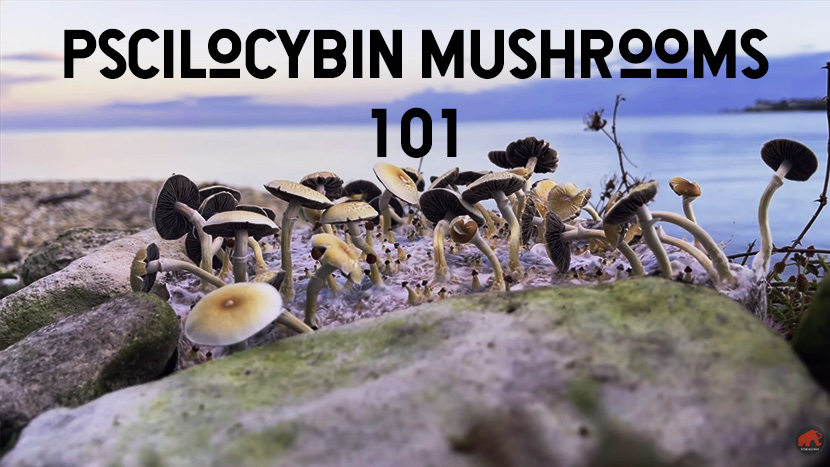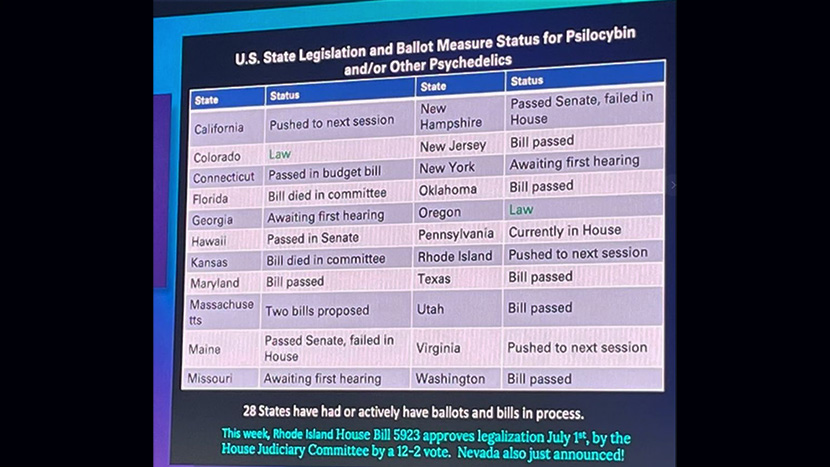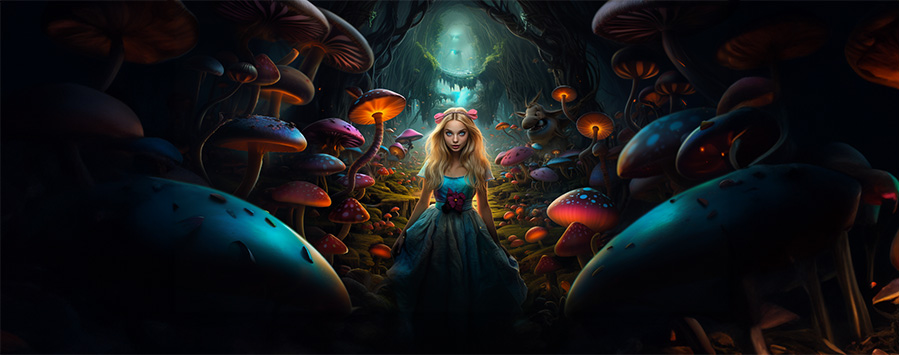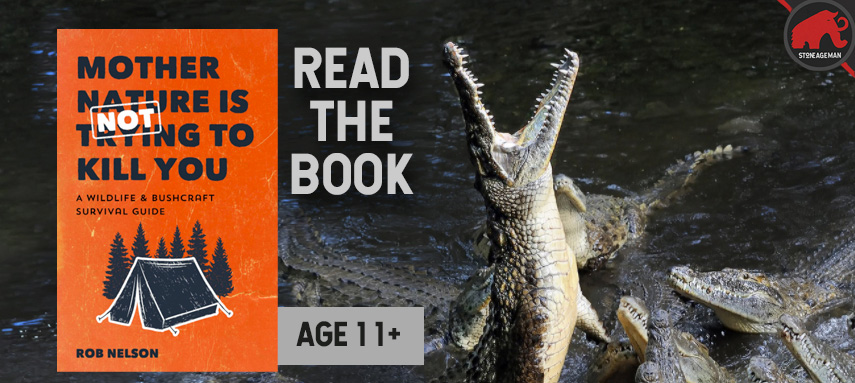Everything You Need to Know About Psilocybin Mushrooms

Imagine you found a magic potion that could help motivate people to achieve their goals, shed bad habits, connect better with themselves and others, and help treat depression and anxiety. It would be incredible, and thousands of people could live happier and healthier lives. Well, though you won’t find a one-size-fits-all magic potion, there is an ancient practice with modern scientific backing that can help many people with these challenges. However, it is not a magic potion… but instead magic mushrooms.
There is a new wave of interest in the use of psilocybin mushrooms for various ailments, through both rituals with a full hero’s dose (or macrodose) and microdosing. And though this magic fungus still remains illegal in many places in the world, people are starting to re-learn about the incredible advantages of taking psilocybin mushrooms. If you are curious about trying it for yourself, you should first understand as much as you can about these psychedelic fungi. This way, you can start your own journey with psilocybin in the safest and most comfortable way. So, let’s get into it.
What Are Psilocybin Mushrooms?
“Psilocybin mushrooms” is the name for mushrooms that contain the chemical compounds of psilocybin and/or psilocin. These are the main psychoactive components that cause hallucinations when they are consumed, but it also does a whole lot more in terms of connections in the brain and body – more on that below. Despite what many people may think, these mushrooms present a relatively low risk on our brains or bodies, especially when taken properly.
About the Psilocybin mushroom definition:
The general term of “psilocybin mushrooms” or “magic mushrooms” refers to some 200+ species of mushrooms. The four genera in this group are Psilocybe, Panaeolus, Pluteus, and Gymnopilus. The most commonly used and probably most well-known genus being Psilocybe, with some 150 recorded species. These psychedelic mushrooms are found all over the world, excluding only Antarctica.
Interestingly, the genus Psilocybe also contains some non-psychoactive species, but they are slowly but surely being transferred into the genus Deconica as people conduct more taxonomic studies on fungi.
Some History About Magic Mushrooms
Cultures in various parts of the world have used magic mushrooms in spiritual ceremonies for a very, very long time. Interestingly, there are even some theories that these mushrooms may have helped our species to adapt, survive difficult scenarios and regions, and may have even been part of forming parts of our culture and the way we carry out social interactions.
Despite all this, psilocybin mushrooms didn’t really come to the attention of people in North America and Western Europe until 1957 when R. Gordon Wasson partook in a magic mushroom ceremony in Mexico and returned to the United States to write about it. He later coined the term ‘magic mushrooms’ based on his experience with them.
Fast forward to the 60s and 70s and this little hallucinogenic fungi gained a lot of popularity. It was being used both in a therapeutic sense, and in the counterculture movement. This is when it also caught the attention of authorities and governing bodies and subsequently was made illegal in much of the world (The reasons why it became illegal seem to be less about the danger it presented and more about shutting down the anti-war movement). Today, as more people re-discover the wonders of this mushroom, and scientific studies are done on its range of benefits, people are changing their minds and slowly changing their legal status.
Legal Status of Psilocybin Mushrooms
Since a lot of the research around psilocybin mushrooms has started to show that it has potential health benefits with little risk, there is currently a shift in the “legality” of magic mushrooms around the world. Changing the legal status of these mushrooms is important for researchers so that they can study their effects. Additionally, in various parts of the world people are making the effort to normalize its use as a therapeutic substance and push for legalization. That seems to be working. We won’t dive too deep into it, because by the time you read this, some of it may have already changed! However, here is what we do know as of July 2023.
The widespread ban of magic mushrooms occurred after the The United Nations Convention on Psychotropic Substances of 1971 which caused many countries to now consider this fungi an illegal substance, with different levels of severity in different places. It was illegal to grow, buy, sell, or be caught with magic mushrooms in most UN countries. This also halted a lot of the research that was being done at the time.
On the other hand, a few countries never banned psilocybin mushrooms (or they were at least unregulated and/or ignored by legal bodies). These countries included Jamaica, The British Virgin Islands, The Bahamas, Brazil, Nepal, Samoa, and the Netherlands (in the form of “truffles” only). Australia recently joined this group, as it legalized psilocybin for medical use as of July 1, 2023. With this psilocybin legalization, they will be considered the first country to officially recognize it for medicinal/therapeutic use.
Psilocybin in North America
In many other parts of the world, things are a little bit all over the place. In the USA for example, Psilocybin mushrooms are still federally considered a “level 1 drug” which means that it “has a high potential for abuse, no currently accepted medical use… and a lack of accepted safety for use under medical supervision.” To put that into perspective, magic mushrooms are considered to be on the same level as heroin.
Despite this, certain states are easing up on restrictions, decriminalizing, and potentially even legalizing psilocybin mushrooms. Both Colorado and Oregon have decriminalized mushrooms and are paving the way to make it legal for therapy. In saying this, it is not allowed to be sold in a retail sense, and there is still a lot of fine print around what is allowed, and what is not. There are around 28 other states working towards legalization as well. (as seen in the following image from Paul Stammets at the Denver Psychedelics Conference 2023).

In Canada, where marijuana is now legal for example, it is still considered a “level 3” drug, meaning much less strict in regulation, but still illegal, for now. The Canadian government web page mentions that there are studies that show promise for medicinal use of psilocybin, but none are yet approved in Canada, ultimately keeping psilocybin in its current illegal status. However, there is a Psilocybin special access program in Canada, which helps people access it for serious illness and end-of-life therapeutic treatments
Overall, with more evidence for the beneficial effects of Psilocybin mushrooms, no evidence for dependence, and very few side effects, people are pushing for legalization in more places. If you want to know more, this blog has a good layout of different legal status in various countries.
The Case for The Legalization of Psilocybin
Drugs are normally made illegal because they are considered dangerous, addictive, have a high potential for abuse, and have no proven-to-be-safe medicinal purposes, but we are starting to see that Psilocybin does not match any of these profiles. For example, if you look at the ratio of lethal dose to effective dose, or how much can kill you versus how much you need to take to experience an effect, Psilocybin is off the charts – in a good way. It is nearly impossible to die from taking it. Though some people can experience bad side effects, like nausea, vomiting, or challenging trips if they take too much, it is pretty much impossible to consume a lethal dose.
There is also no evidence that psilocybin is addictive. This next graph shows various drugs to help compare. Those higher up are more addictive and more to the right more dangerous, and you can see psilocybin is extremely far removed from all of them. Ironically, psilocybin mushroom treatment is also showing great promise as a way for people to quit harmful drug addictions, such as opioids. For comparison, you’ll notice that caffeine can be considered more harmful in both ways!
In addition to these facts, research, and ancient medicine, shows us that it does indeed have high potential for medicinal use.The FDA has recently classified it as a “breakthrough therapy for severe depression” which is supposed to help fast track the ability for production and use of the substance.
Overall, magic mushrooms have been given a bad reputation. But the research on how it can help people with anxiety and depression, can reduce chronic pain, aid in therapies for veterans with PTSD, and aid in anxiety for end of life cancer patients, has all helped lawmakers move towards changing the legal status of Psilocybin.
Psilocybin Mushroom Research
There is more and more modern research about psilocybin mushrooms happening around the globe, and the large majority of it is very positive, so we will just offer a snapshot into some examples.
Paul Staments is one of the most well known mycologists leading the charge on magic mushroom research and discovering how it can help people with various ailments – but he is not alone. There is research happening both on the effects of macrodosing and microdosing magic mushrooms. For example, People who microdose say that Psilocybin reduces anxiety and depression, and studies have also shown a drop in these same issues after just a single macrodose accompanied by therapy.
If you are curious about the latter, Dr. Roland Griffiths talks about his ground breaking psilocybin research here.
Additionally, other multi-phase clinical trials on therapeutic use of psilocybin have also given people more faith in the positive impacts and lack of side-effects.
This Psilocybin mushroom review is another great resource. It references various studies that back up that these mushrooms are both non-addictive and beneficial in terms of both mental health and chronic pain.
All of this aside, we also know that cultures around the world have used this hallucinogenic fungi for a very long time, and their traditional knowledge helps to show us that this is not some “party drug” but something that can change people’s lives for the better, when used in the right way of course.
How Psilocybin Impacts the Brain
There are a few things going on with psilocybin in the brain, but long story short, psilocybin is a serotonergic hallucinogen that helps to increase the connections in the brain and allow people to perceive things at a higher level. This is what makes colors and music more vivid, and what ultimately helps people to get new insights into their lives, form stronger connections with themselves and others, find new solutions to old problems, learn better (as the brain is a bit more plastic again), and so on. This is why, when paired with a set intention and guided therapy, people are able to overcome hurdles, like traumas or addictions, that they couldn’t without the magic mushrooms.
Psilocybin Mushroom Benefits
Psilocybin mushrooms therapy has shown to help with a wide range of symptoms. People who use psilocybin mushrooms for depression, anxiety, and PTSD have had great results. Some other potential benefits include:
- Helping to set and achieve goals
- Reduced triggering from traumas
- Strengthening emotional connections
- Dealing with difficult emotions
- Increased energy
- Quitting addictions (For example one study showed a 80% success rate of quitting smoking compared to 35% using classic pharmaceutical drugs).
- Lessened migraines
- Reduced PMS and menstrual symptoms
- And more…
Overall, the way that this psychedelic fungi works in our brain can help us to deal with a huge range of mental and physical ailments, especially when done with intention and paired up with therapy.
Potential Negative Effects of Psilocybin
It is important to note that there are very few potential negative side effects of taking magic mushrooms. That being said, most negative effects occur from taking too high of a psilocybin dose at once or from mixing with other substances, and can easily be avoided. So just to be thorough, here is a list of concerns and precautions around taking psilocybin mushrooms (especially if unsupervised):
- People can get light-headed, nauseous, and experience mild numbness or muscle weakness, sweating, chills, dry mouth, vomiting, and diarrhea if they take too much
- Mushrooms can have slightly varied concentrations of psilocybin
- Misidentification of mushrooms could cause poisoning
- Psilocybin can cause increased heart rate and blood pressure
- “Bad trips” (otherwise known now as “difficult trips”) can happen. These can cause things like:
- Anxiety and panic attacks
- Confusion and disorientation
- Fear or paranoia
With that being said, magic mushrooms are best taken with consultation of an expert guide to help decrease the chances of having these negative effects!
Identification of Psilocybin Mushrooms
As we mentioned before, there are a lot of species of “magic mushrooms” and they can be difficult to identify, so, if you are starting out and want to collect them in the wild, we really recommend working with a knowledgeable mycologist. And when in doubt, never eat a fungus you aren’t sure about.
In terms of Psilocybe mushrooms, they tend to be small, white to brown in color, and often (not always!) turn a bluish or purplish black when they are crushed. Interestingly, this is caused by the psilocybin reacting with oxygen.
Now, there are no known species in Psilocybe that are toxic, however, there are species in other genera that can look similar and are. So again, it is so important to be careful if you plan on foraging psychedelic mushrooms yourself.
They can be found growing in animal feces, in wood chips, and in other broken down material. They tend to like damp areas, like most fungi. Interestingly, though many people go out to the forest to find them, they seem to do particularly well in urban environments.
Using Psilocybin Mushrooms
There are two key ways in which people are using magic mushrooms: microdosing and macrodosing. Many people will recommend the macrodose, or “hero’s journey” for real results. It is also an excellent alternative to other antidepressant medication because you don’t have to take it daily like other pills and it doesn’t have the same side effects like weight gain, and sometimes worsening depression. On the other hand, there are more and more people who are really excited about the benefits of microdosing psilocybin.
Some people are still of course worried about psilocybin mushroom safety, and this is why, whichever method you try, it is best to do so with an expert. This way you have someone to guide you, help you set intentions, track your progress and make sure that your psilocybin mushroom dosage is the right one for you.
Rob for example had his first experience with magic mushrooms in a safe setting in a psilocybin retreat Jamaica, and said it was life changing. For this and more, check out the video below, and head over to this page for more on microdosing psilocybin!
All in all, taking psilocybin mushrooms won’t be for everyone, but we believe that magic mushrooms could be a huge breakthrough in mental health, and might just make the world a better place.


